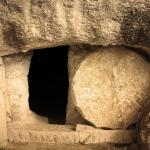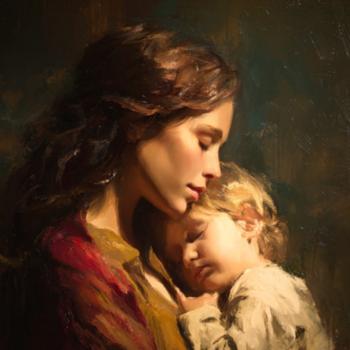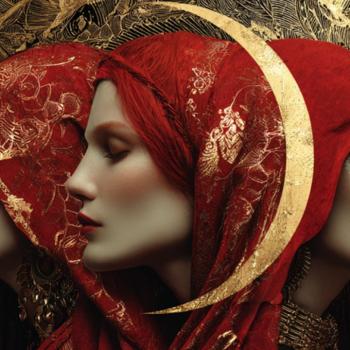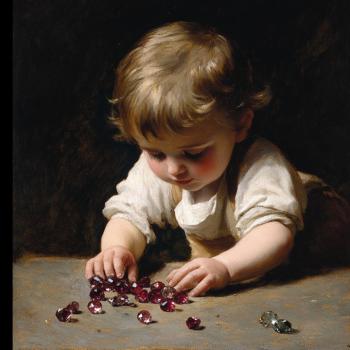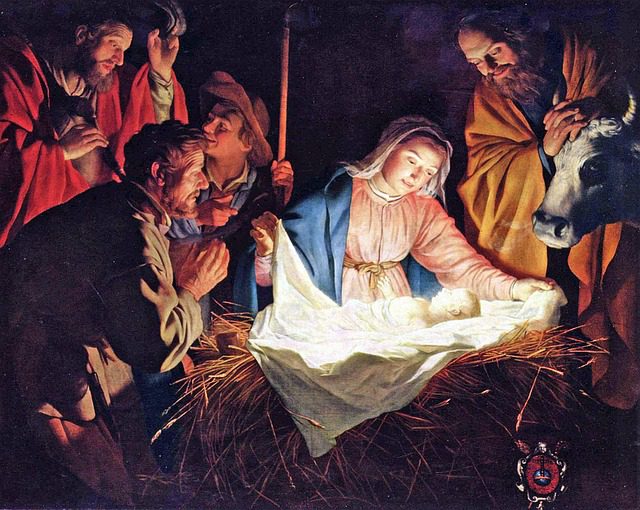
NOTE: Today’s post is my transcription of a 2010 interview with Mary Emily Briehl Duba, in which she reflects on the incarnation as God’s act of peacemaking. This interview is a companion piece to her chapter, “Peacemaking and Nonviolence,” in On Our Way: Christian Practices for Living a Whole Life (2010), a book that invites emerging adults to explore “a way of life overflowing with God’s justice, mercy, and love” (from the Introduction). This video is one of thirteen interviews with the authors of On Our Way, all of which can be found by searching for “On Our Way” at www.theworkofthepeople.com
The Incarnation – by which we mean “God coming to dwell with us in the person of Jesus” – is God’s radical act of peacemaking. God subverted every expectation humankind had for what peace would look like; what the Messianic expectation was. The people of Israel were expecting a warrior King. Someone who would come to save the people through a military victory over their enemies and rule as this righteous warrior King. God subverted their expectation by coming in the form of a vulnerable and dependent infant.
For Christians, peacemaking begins with the body of Christ; with this child Jesus who has subverted every expectation we have for what peace – “shalom” – will look like.
Shalom is this state where “all is well”; where people have access to the food they need, the healthcare they need, the opportunity for just relationships with one another and with God and with the Earth. It’s more than what we think of as “peace”. It’s more than a cease fire. More than a starry night and songs around the campfire. It’s something much more holistic. Much more grand and whole. It’s God’s vision for the Universe as God created it to be. So the work of peacemaking, the practice of peacemaking, really begins there.
It’s about imitating Christ who is “the revolutionary face of the God of nonviolence.” I love that because it really encapsulates that this person of Jesus, this reconciling activity that God is doing in Jesus, is more than what we could have expected. It subverts our inclinations towards violence. And it subverts our idolatry of fear. That we would raise our fears to a level of an idol. That we would need to respond violently because we are so afraid. Because violence does reign in our world. And that’s a reality that we can’t escape. But we have the opportunity as Christians to choose not to idolize our fear. To choose instead to worship the One God who made heaven and earth and whose vision for us is “shalom”.
Jesus tells a parable about a woman who puts just a little bit of yeast into a bowl of many measures of flour – enough for many dozens of loafs of bread – and says, “This is like the Kingdom of God”.
So, I think about yeast as this tiny little speck of life, this little growth that, even though it is tiny it can give life and leaven to the whole batch. So, I like to think of our acts of peacemaking – the Body of Christ in the world – as this little bit of leaven that, as small as it may seem in a world that is so incredibly violent, in a world that is at war, it is enough and more. It will give life and leaven to the whole creation. God has promised that it will be so. That what is small – these daily acts of peacemaking; those moments where we chose to not to say what we might have said, not to send the email that might have damaged a relationship, not to retaliate when we are provoked –those seemingly small choices give life and leaven to the whole bowl of wheat; the whole batch of creation.
God does not come as a warrior king. God comes as a baby. God’s power is hidden under the signs of vulnerability. God comes in poverty. God comes to a young woman who had no status in the community. God’s glory is hidden in the ugliness of our lives. In places of violence, in places of suffering, God is there, hidden among us. This is the theology of the cross. That in the horror of the cross, in the violence, in the ugliness, and the weakness of a man stripped and beaten and hung to die there is something more powerful at work. Hidden under these signs of weakness is the glory of God.
So as Christians we refuse to take up what the world sees as signs of power. We refuse – we don’t always, we fall short in this – But we want to say, “We refuse to be oppressors. We refuse to be dominators. We refuse all of the signs in the world that make for power.”
Instead, we choose weakness. We choose vulnerability. We choose to love. To have our hearts broken. We chose this because we know that under those signs, in the manger, among the cattle, on the cross, among the poor, God is there. We are not afraid of being poor. We are not afraid of imprisoned. We are not afraid of standing on the side of those who are weak. We are not afraid to be with God’s little ones. Because there is vulnerability, there is the glory of God. Where there is suffering God’s peace is stronger. No matter how hidden it may seem. In death, there is abundant life.
God has already done the radical, the subversive revolutionary act of peacemaking and reconciliation in Christ. God has made peace between God and Creation. There’s no bigger gulf than that. There’s no bigger disconnect than between the Divine and the Human. All we have to do is make peace among human beings.
God has done the radical thing. We just have to live into that promise.
– Mary Emily Duba
Mary Emily Briehl Duba (PhD ’18, University of Chicago; MDiv ’09, Yale Divinity) is now Visiting Assistant Professor of Theology at the University of Dubuque Theological Seminary and a Louisville Institute Postdoctoral Fellow. She is the author of “Peacemaking and Nonviolence,” in On Our Way: Christian Practices for Living a Whole Life, ed. Dorothy C. Bass and Susan R. Briehl (Upper Room Books, 2010). Her doctoral dissertation, “God is Here: A Theology of Place and Displacement,” constructs a systematic theology in response to our global refugee and ecological crises.
Transcript above taken from this video clip below:
**
Keith Giles was formerly a licensed and ordained minister who walked away from organized church 11 years ago, to start a home fellowship that gave away 100% of the offering to the poor in the community.
Today, He and his wife live in Meridian, Idaho, awaiting their next adventure.
His new book “Jesus Unbound: Liberating the Word of God from the Bible”, is available now on Amazon and features a Foreword by author Brian Zahnd.
He is also the author of the Amazon best-seller, “Jesus Untangled: Crucifying Our Politics To Pledge Allegiance To The Lamb” with a Foreword by Greg Boyd.
Keith also co-hosts the Heretic Happy Hour Podcast on iTunes and Podbean.
BONUS: Want to unlock exclusive content including blog articles, short stories, music, podcasts, videos and more? Visit my Patreon page.


